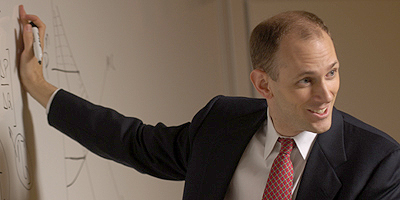![[Chronicle]](/images/sidebar_header_oct06.gif)
Vol. 26 No. 10
current issue
archive / search
contact
Past Opine interviews:
Lauren Berlant
Stephen Berry
John Boyer
David Cohen
Jerry Coyne
John Cunningham
Richard Epstein
John Frederick
Henry Frisch
Austan Goolsbee
Bernard Harcourt
Greg Jackson
Martin Marty
Martha Nussbaum
Raymond Pierrehumbert
José Quintáns
Jan-Marino Ramirez
Saskia Sassen
William Sewell
Herman Sinaiko
Geoffrey Stone
Cass Sunstein
Simon Swordy
Opine: Austan Goolsbee
 Austan Goolsbee | |
This week, Austan Goolsbee, the Robert P. Gwinn Professor of Economics in the Graduate School of Business, is of the opinion . . .
What book should every person read and why?
I recently read The Shia Revival by Vali Nasr. Given that our country’s taste for oil isn’t going away any time soon, we would do well to have some idea of what’s really going on and this book is an excellent start.
If you could meet any scholar, author, composer, musician or entrepreneur—dead or alive—who would it be and why?
If you mean for a dinner, I would go with someone funny—Will Rogers, maybe. But for something longer, Coluccio Salutati—Chancellor of Florence in the late 1300s and one of the original humanists. He created a library, gathered young scholars like Bruni and Poggio and brought in Byzantine scholars to teach Greek so they could read the classics together. He effectively kick-started the Florentine renaissance and was also a brilliant orator and writer who helped saved them from invasion by the Visconti dictator of Milan, and who believed that education was the foundation of a free republic. I would very much like to have met him.
Among the complex moral and political issues that affect humanity, which do you believe will never be resolved and why?
That’s a depressing way to put it. I suppose that people will always have a certain penchant for brutality, though that is not an excuse to ignore it.
If politicians had to pass an exam before they were allowed to serve in public office, what question would you add to the test?
Do you understand marginal cost?
If you could choose any three University professors and give them a one-year sabbatical together to solve a problem, develop a theory or make a discovery, who would they be and what task would you assign them?
I’m not a fan of telling people what they ought to research. We have a good chunk of the smartest people on the planet. Give them the sabbatical and let them research whatever they want. At Chicago we have geneticists figuring out the roots of human disease, astrophysicists contemplating the origins of the universe, and economists finding the sources of income inequality and how to address them. Those seem plenty important to me.
Think of a renowned scholar from the past who added great value to your area of study. What would this person think of the advances that recently have been made in this field?
Alfred Marshall, the great English economist of the late 18- and-early 1900s, helped found the modern field as we know it. He wanted economics to have a scientific foundation and, also, to be relevant to the world. He would be thrilled at the rise of empirical work throughout economics. He would probably be surprised by how much math and statistics it has taken us to do that, though. I’d like to think that if he saw how much we have been able to accomplish, he would not be upset by our drift away from the lay public. And he certainly would have been gratified to see how important economics has become for policy-makers.
What building on campus do you think is the most interesting architecturally and why?
I love old buildings, and I love books, so I will go with the Chicago Theological Seminary.
Will a liberal arts education remain relevant to students in our increasingly technological society? Why or why not?
I love science and technology. And I am an economist so you know I find merit in the specialization of labor. But, I am not worried about people deciding they don’t need a liberal arts education. No matter how practical or profession-obsessed the world gets, it will always desperately need people who can think, solve problems and explain ideas. After several thousand years, no one has come up with a better system for that than a liberal arts education.
How will the next generation of scholars—today’s students—change your field in the decades to come?
It blows me away how much of the really interesting work in economics comes from people new to the field. In my part of economics—empirical, data-driven stuff—I expect the next generation to find data and examine the economics of things far from the origin. We already have seen the trend with work analyzing the economics of media content, crime, school choice, dating, all kinds of things. If you could buy stock in academics, I would tell you to go put your 401(k) into these young economists. They are fabulous.